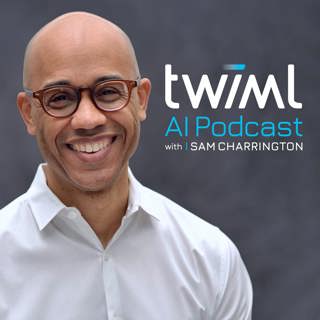
Visualizing Climate Impact with GANs w/ Sasha Luccioni - #413
Today we’re joined by Sasha Luccioni, a Postdoctoral Researcher at the MILA Institute, and moderator of our upcoming TWIMLfest Panel, ‘Machine Learning in the Fight Against Climate Change.’ We were first introduced to Sasha’s work through her paper on ‘Visualizing The Consequences Of Climate Change Using Cycle-consistent Adversarial Networks’, and we’re excited to pick her brain about the ways ML is currently being leveraged to help the environment. In our conversation, we explore the use of GANs to visualize the consequences of climate change, the evolution of different approaches she used, and the challenges of training GANs using an end-to-end pipeline. Finally, we talk through Sasha’s goals for the aforementioned panel, which is scheduled for Friday, October 23rd at 1 pm PT. Register for all of the great TWIMLfest sessions at twimlfest.com! The complete show notes for this episode can be found at twimlai.com/go/413.
28 Syys 202041min

ML-Powered Language Learning at Duolingo with Burr Settles - #412
Today we’re joined by Burr Settles, Research Director at Duolingo. Most would acknowledge that one of the most effective ways to learn is one on one with a tutor, and Duolingo’s main goal is to replicate that at scale. In our conversation with Burr, we dig how the business model has changed over time, the properties that make a good tutor, and how those features translate to the AI tutor they’ve built. We also discuss the Duolingo English Test, and the challenges they’ve faced with maintaining the platform while adding languages and courses. Check out the complete show notes for this episode at twimlai.com/go/412.
24 Syys 202055min

Bridging The Gap Between Machine Learning and the Life Sciences with Artur Yakimovich - #411
Today we’re joined by Artur Yakimovich, Co-Founder at Artificial Intelligence for Life Sciences and a visiting scientist in the Lab for Molecular Cell Biology at University College London. In our conversation with Artur, we explore the gulf that exists between life science researchers and the tools and applications used by computer scientists. While Artur’s background is in viral chemistry, he has since transitioned to a career in computational biology to “see where chemistry stopped, and biology started.” We discuss his work in that middle ground, looking at quite a few of his recent work applying deep learning and advanced neural networks like capsule networks to his research problems. Finally, we discuss his efforts building the Artificial Intelligence for Life Sciences community, a non-profit organization he founded to bring scientists from different fields together to share ideas and solve interdisciplinary problems. Check out the complete show notes at twimlai.com/go/411.
21 Syys 202040min

Understanding Cultural Style Trends with Computer Vision w/ Kavita Bala - #410
Today we’re joined by Kavita Bala, the Dean of Computing and Information Science at Cornell University. Kavita, whose research explores the overlap of computer vision and computer graphics, joined us to discuss a few of her projects, including GrokStyle, a startup that was recently acquired by Facebook and is currently being deployed across their Marketplace features. We also talk about StreetStyle/GeoStyle, projects focused on using social media data to find style clusters across the globe. Kavita shares her thoughts on the privacy and security implications, progress with integrating privacy-preserving techniques into vision projects like the ones she works on, and what’s next for Kavita’s research. The complete show notes for this episode can be found at twimlai.com/go/410.
17 Syys 202038min

That's a VIBE: ML for Human Pose and Shape Estimation with Nikos Athanasiou, Muhammed Kocabas, Michael Black - #409
Today we’re joined by Nikos Athanasiou, Muhammed Kocabas, Ph.D. students, and Michael Black, Director of the Max Planck Institute for Intelligent Systems. We caught up with the group to explore their paper VIBE: Video Inference for Human Body Pose and Shape Estimation, which they submitted to CVPR 2020. In our conversation, we explore the problem that they’re trying to solve through an adversarial learning framework, the datasets (AMASS) that they’re building upon, the core elements that separate this work from its predecessors in this area of research, and the results they’ve seen through their experiments and testing. The complete show notes for this episode can be found at https://twimlai.com/go/409. Register for TWIMLfest today!
14 Syys 202043min

3D Deep Learning with PyTorch 3D w/ Georgia Gkioxari - #408
Today we’re joined by Georgia Gkioxari, a research scientist at Facebook AI Research. Georgia was hand-picked by the TWIML community to discuss her work on the recently released open-source library PyTorch3D. In our conversation, Georgia describes her experiences as a computer vision researcher prior to the 2012 deep learning explosion, and how the entire landscape has changed since then. Georgia walks us through the user experience of PyTorch3D, while also detailing who the target audience is, why the library is useful, and how it fits in the broad goal of giving computers better means of perception. Finally, Georgia gives us a look at what it’s like to be a co-chair for CVPR 2021 and the challenges with updating the peer review process for the larger academic conferences. The complete show notes for this episode can be found at twimlai.com/go/408.
10 Syys 202035min

What are the Implications of Algorithmic Thinking? with Michael I. Jordan - #407
Today we’re joined by the legendary Michael I. Jordan, Distinguished Professor in the Departments of EECS and Statistics at UC Berkeley. Michael was gracious enough to connect us all the way from Italy after being named IEEE’s 2020 John von Neumann Medal recipient. In our conversation with Michael, we explore his career path, and how his influence from other fields like philosophy shaped his path. We spend quite a bit of time discussing his current exploration into the intersection of economics and AI, and how machine learning systems could be used to create value and empowerment across many industries through “markets.” We also touch on the potential of “interacting learning systems” at scale, the valuation of data, the commoditization of human knowledge into computational systems, and much, much more. The complete show notes for this episode can be found at. twimlai.com/go/407.
7 Syys 202056min

Beyond Accuracy: Behavioral Testing of NLP Models with Sameer Singh - #406
Today we’re joined by Sameer Singh, an assistant professor in the department of computer science at UC Irvine. Sameer’s work centers on large-scale and interpretable machine learning applied to information extraction and natural language processing. We caught up with Sameer right after he was awarded the best paper award at ACL 2020 for his work on Beyond Accuracy: Behavioral Testing of NLP Models with CheckList. In our conversation, we explore CheckLists, the task-agnostic methodology for testing NLP models introduced in the paper. We also discuss how well we understand the cause of pitfalls or failure modes in deep learning models, Sameer’s thoughts on embodied AI, and his work on the now famous LIME paper, which he co-authored alongside Carlos Guestrin. The complete show notes for this episode can be found at twimlai.com/go/406.
3 Syys 202041min






















